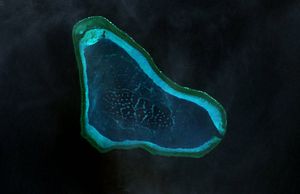China appears determined to begin land reclamation activities at Scarborough Shoal in the South China Sea. According to a report published Monday by the South China Morning Post citing a “source close to the PLA (People’s Liberation Army) Navy,” China will begin dredging activities there later this year and may ultimately add another airstrip in the South China Sea.
“Beijing will take action to carry out land reclamation at Huangyan (the Chinese name for Scarborough Shoal) Island within this year,” the source told SCMP. “China should regain the initiative to do so because Washington is trying to contain Beijing by establishing a permanent military presence in the region,” the source added, echoing the Chinese government’s official position that U.S. Navy activities in the South China Sea, including freedom of navigation operations, patrols, and drills with regional states are contributing to militarization of the area. It is unclear if the source who spoke to the SCMP is an active member of the People’s Liberation Army Navy (PLAN) or an independent analyst who studies maritime affairs in China.
As I discussed in The Diplomat earlier this year, Admiral John Richardson, the U.S. Navy’s chief of naval operations, noted that the United States had observed increased Chinese “surface ship activity” near Scarborough Shoal. The context surrounding a possible commencement of dredging activities at Scarborough Shoal is important. The shoal sits 120 nautical miles off the coast of the Philippines’ Luzon Island. The Philippines is a claimant to Scarborough Shoal and the feature’s previous administrator before Chinese seized it in a publicized 2012 stand-off that presaged much of the contemporary tensions in the South China Sea.
Gregory Poling and Zack Cooper at the Center for Strategic and International Studies (CSIS) in Washington, D.C., noted that, as of late March 2016, there was “no Chinese dredging or construction activity at Scarborough Shoal.” More recent reports citing Filipino authorities that the China’s Coast Guard has intensified its activities near Scarborough Shoal.
The Philippines has filed a case against China at the Permanent Court of Arbitration (PCA) in The Hague. The PCA is expected to reach a verdict in Philippines v. China in either late May or June this year and, where it has jurisdiction, the ruling is expected to go in Manila’s favor. China has said that it does not recognize the validity of the case and has refused to participate.
The commencement of reclamation activities at Scarborough Shoal would be unprecedented in an important way. Each of the other features in the South China Sea where China has constructed artificial islands (Gaven Reef, Hughes Reef, Subi Reef, Mischief Reef, Cuarteron Reef, Fiery Cross Reef, and Johnson Reef) were previously occupied by Beijing for decades. Scarborough Shoal, unlike the other features, was seized from another claimant recently.
Moreover, if the PCA ruling invalidates China’s ill-defined nine-dash line claim in the South China Sea and clarifies aspects of the Philippines’ exclusive economic zone, reclamation activities at Scarborough Shoal would be an exceptionally egregious violation of the ruling. China, no doubt, will suffer some reputational costs in the South China Sea after the PCA verdict, but any intensified activity at Scarborough Shoal would serve to multiply that.
If, however, Beijing wants to send a message that it is actively interested in defying international law, there’s no better way to send that signal than begin reclamation activities at Scarborough Shoal after the PCA verdict this summer. Strategically, an artificial island at Scarborough Shoal could have immense value for the PLAN. For instance, an over-the-horizon radar installation there could give the PLAN unprecedented maritime domain awareness of U.S. and Philippines Navy activities off the western coast of Luzon, where important military facilities, including Subic Bay and Basa Air Base. (The latter is one of five locations that the two allies have operationalized under their recently activated Enhanced Defense Cooperation Agreement.)

































